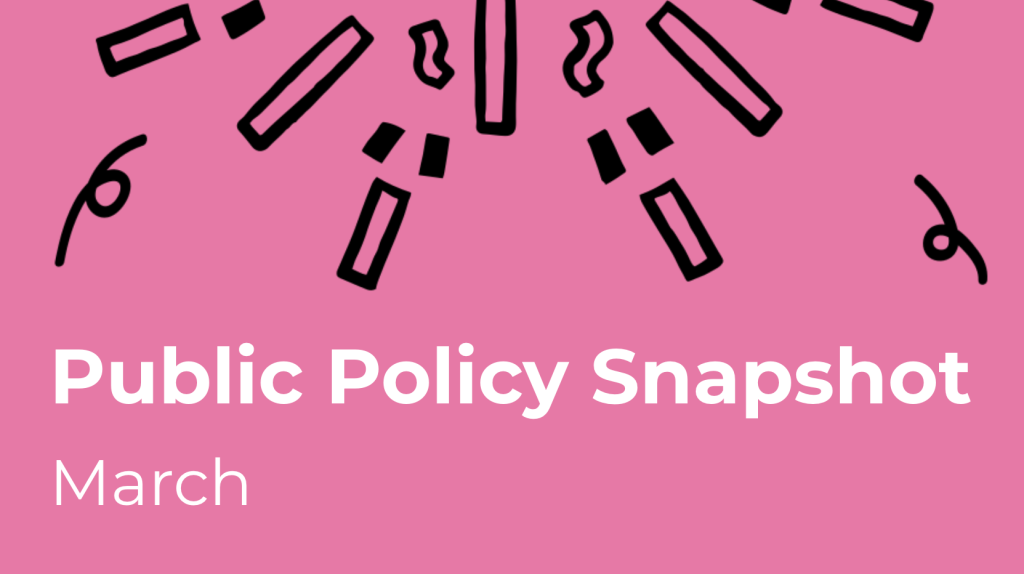
In case you blinked, we’re happy to catch you up with legislative and regulatory developments around the world that shape people’s ability to participate in the free knowledge movement.
Here are the most important developments that have preoccupied the Wikimedia Foundation’s Global Advocacy team.
US Legislative Developments
- Sec. 230: As part of our work advocating for protections for online intermediaries like Wikipedia, our team participated in a symposium hosted by William and Mary Law School. The panel discussion about ‘Business Law’s Response to Emerging Cultural Issues’ covered how crucial Section 230 of the Communications Decency Act has been to the development of free expression online, as well as how the various proposals to amend it may negatively impact the Internet. Our policy specialist Kate Ruane highlighted how these proposed changes would impact nonprofit projects like Wikipedia, and other online services, that are distinct from the large social media companies often at the center of the debate surrounding proposed changes to Section 230.
- Journalism Competition & Preservation Act (JCPA): Wikimedia Small Projects hosted our team for an episode of the SuenaWiki podcast to discuss the challenges posed by the JCPA currently under consideration in the US Congress.
Latin America and the Caribbean
- Argentina: The Foundation’s Global Advocacy and Legal teams collaborated to file an amicus brief in the Supreme Court of Argentina in a right to be forgotten case (Denegri v. Google Inc). The applicant, a public figure, is asking Google to delist their name from content related to their media past, which they wish to be forgotten. In our brief, we argue that the right to be forgotten should not apply in this case as doing so would be an obstacle to freedom of expression and the right to information.
- Chile: Both international and Chilean groups, including Wikimedia Chile, have expressed concern over legislation under consideration in the Chilean Congress to regulate digital platforms. Our blog post highlights the shortcomings of the Bill, including ambiguous language, impractical content moderation requirements, and a lack of consideration of community-led platforms. The Bill has the potential to become a misguided influence on similar regulations throughout the region, if approved.
Asia
- Bangladesh: Authorities are currently reviewing the recommendations for proposed regulations, which could potentially impact Wikimedia’s volunteer-driven model and impose a short timeline for content removal and excessive penalties. A coalition letter signed by the Wikimedia Foundation and sent to the Bangladesh Telecommunication Regulatory Commission on 7 March outlines the concerns of major international human rights and internet freedom groups with the proposed “Regulation for Digital, Social Media, and OTT Platforms.” The letter has received significant media attention by Bangladesh’s major print and online media.
European Union
- Digital Markets Act (DMA): On March 24, the three main EU bodies concluded negotiations over a common version of the DMA, an EU regulation that is intended to ensure a higher degree of competition among services on the internet by preventing large companies from abusing their power. The Free Knowledge Advocacy Group EU has been monitoring these developments and advocating for provisions that will enable free knowledge projects to thrive. An analysis of the practical consequences of the negotiation outcomes regarding interoperability of services can be found in their blogpost.
Additional Developments
- United Kingdom Online Safety Bill: The United Kingdom (UK) Government formally introduced its long-awaited Online Safety Bill on Thursday, March 17. Our Global Advocacy team published an initial assessment of what this Bill means for community-governed platforms like Wikipedia. The Bill attempts to hold internet platforms accountable for harmful content that is spread via their services, but the approach promoted in the UK Bill is misguided both in terms of the users it claims to protect and the platforms it supposedly holds accountable. Stay tuned for a deep-dive analysis of the Bill.
- The European Court of Human Rights has dismissed the Wikimedia Foundation’s 2019 petition to lift the block of Wikipedia in Turkey. The Court explained its decision on the grounds that the Turkish government had already restored access to Wikipedia in January 2020, and because the block was already determined to be a human rights violation in the Turkish Constitutional Court’s December 2019 ruling. The European Court of Human Rights’ decision comes at a time when access to knowledge continues to be under threat around the world. The Wikimedia Foundation will continue to defend the right of everyone to freely access and participate in knowledge. Learn more about the case, and the current status of Turkish Wikipedia in the Foundation’s official statement.
- World Intellectual Property Organization (WIPO): The Global Advocacy team has supported a group of Wikimedia chapters in applying for ad hoc observer status at the WIPO Standing Committee on Copyright and Related Rights. Observer status in this body will allow the Wikimedia Movement to have a voice in future discussions shaping copyright issues globally. The team has also been supporting interested affiliates to apply for permanent observer status at WIPO, which will allow them to participate in discussions on other intellectual property issues (e.g., traditional knowledge, climate change) that impact access to knowledge. Chapters we have helped apply for permanent and ad hoc observer status include those of Argentina, France, Germany, Italy, Mexico, South Africa, Sweden, Switzerland.
To learn more about our team and the work we do, follow us on Twitter (@WikimediaPolicy) or sign-up to the Wikimedia public policy mailing list. The team’s Meta page is under construction.

Can you help us translate this article?
In order for this article to reach as many people as possible we would like your help. Can you translate this article to get the message out?
Start translation